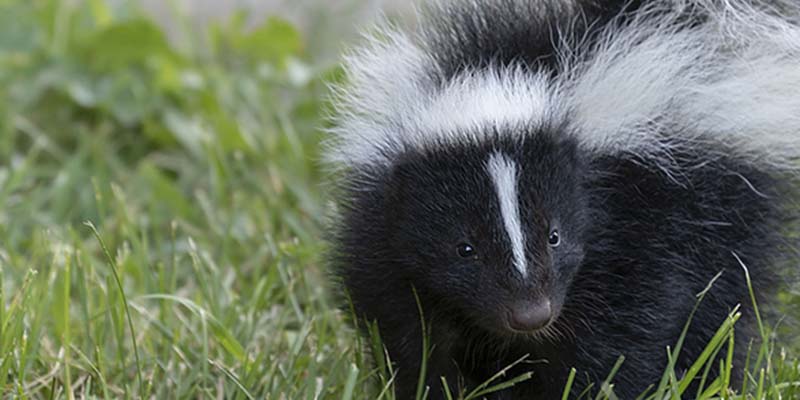
If you follow the local social media pages, it should come as no surprise that deer, coyotes, and geese, have served as spirited topics of discussion over the past several years. The city also receives a number of inquiries related to skunks, raccoons, and other nuisance animals…and how to manage them.
By and large, we live in an urban environment and coexisting with native species takes a little work sometimes to keep from getting the wrong end of…well, we’ll leave it at that.
We caught up with Sam O’Connell, Natural Resources Specialist with the City of Mentor, who was able to provide us with answers to some common questions.
Should I be concerned about seeing skunks or raccoons around my house?
Contrary to popular belief having skunks in your neighborhood has its benefits. They’re omnivores which means they eat a wide variety of foods, including things like common lawn and garden pests, voles, and even wasps.
Raccoons provide a similar benefit. They consume many common pests found in urban environments and have a particular affinity for wasps as well. Raccoons are also seed disperses helping plants spread to new areas.
If I see a skunk or racoon during the day, does that mean it’s sick?
No. Their peak activity times are at dawn and dusk, but you can see them any time of day or night. It is also possible that the animal you’re seeing walking around in the daylight was disturbed from where it was sleeping and is on its way to find another location that is safe and quiet. An animal with rabies or distemper, however, displays very obvious symptoms that can include:
- A lack of fear of humans that exceeds normal animal curiosity
- Disorientation or loss of coordination
- Excessive drooling or foaming of the mouth
Should an animal be seen presenting these symptoms, monitor the location of the animal but do not approach, ensure all pets and children are indoors and are not able to come into contact with it, and immediately call the Mentor Police Department non-emergency line at (440) 255-1234 to request assistance.
Are skunks and raccoons considered nuisance animals?
Whether or not an animal is a nuisance depends entirely on the situation. In urban environments, animals tend to become a nuisance when their population becomes too large, or they become overly comfortable in the presence of humans – a process known as habituation. Simply seeing a racoon or a skunk does not imply they are being a nuisance, but digging under structures, rummaging through garbage cans, living in attics, or damaging gardens and landscaping, are considered nuisance activities.
What can I do to keep them from hanging around on my property?
The most important thing one can do to keep animals from hanging around and becoming nuisance wildlife is to make the area as undesirable for them as possible.
Limit food availability by not leaving pet food and water bowls outside at night, secure all garbage can lids tightly, regularly clean underneath bird feeders, and dispose of fallen fruit from trees or shrubs.
Another important step is making sure they can’t take up residence on your property by closing all gaps under structures like sheds or porches. The best way to do this is to create an L-shaped footer which is buried underground that prevents the animal from digging their way under it. If wildlife is damaging gardens or landscaping, homeowners should consider planting less palatable varieties, install temporary fencing, or purchase nontoxic chemical deterrents which will make ornamental plants less palatable to wildlife.
Another way to deter animals from your yard is to install motion detecting lights which them feel uncomfortable when roaming around at night.
Too late, I have skunks living under my porch. How do I get rid of them? Does the City offer trapping services?
The City of Mentor does not offer any type of animal control or nuisance wildlife removal services. Those who are interested can download a list of all Commercial Nuisance Wild Animal Control Operators licensed in Ohio sorted by county on our website under the “Other Nuisance Animals” section. Property owners may also trap the animal themselves.
If a licensed trapper has been contracted, trapper will pick up the animal and take it off site to be disposed of. If an individual chooses to trap nuisance wildlife themselves, it is their sole responsibility to euthanize the animal quickly and humanely.
Why can’t I just trap them and let them go in a park?
Relocating an animal is likely to result in unintended consequences. Trapped animals must be released onto the same property they originated from or they must be euthanized. It is against state law to transport and release trapped wildlife elsewhere. This is to prevent the spread and transmission of zoonotic diseases to new areas and different populations of wildlife.
Can I shoot them with a pellet gun?
No. It is not permitted to discharge a firearm (including pellet guns) within city limits.
Where can I learn more?
The Ohio Department of Natural Resources Nuisance Wildlife Resource page provides a lot great information about managing human-wildlife conflicts broken down by species. You can also contact the Lake County Wildlife Officer at (330) 644-2293.
Of course, residents are also welcomed to contact the City of Mentor Natural Resources Office at (440) 974-5717. We are pleased to answer any questions they may have.
The City of Mentor Natural Resources Division is dedicated to the preservation, conservation, study and management of the city’s natural areas. Follow them on Facebook.
